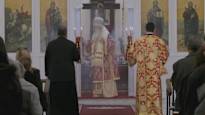Syria’s Christians hope that the leadership of the revolution, which is made up of mainly Sunni Muslims, will respect freedom of religion.
Christian churches in Syria opened their doors on Sunday for the first services after the revolution in mixed moods.
On the one hand, the fall of the autocratic regime made me happy, but the uncertainty about the future regime’s attitude towards other ethnic groups and religious minorities worried me.
Some of those who attended the services wept openly in Damascus.
– The new government is promised to be formed quickly. If the Creator allows, things will change for the better after the tyrant is defeated, says a person who attended church services in Damascus Jihad Raffoul news agency for AP.
Before the civil war, ten percent of Syria’s population were Christians. Many of them fled the country during the war or supported Bashar al-Assad’s regime in fear of extremist Islamist groups.
A week ago in Damascus, religious services were canceled when Islamist rebels took control of the capital for good.
– The events scared us, says an employee of the Catholic parish in Damascus of Ibrahim Shah.
Religion separates, homeland common
There are Christian communities especially in Damascus and on the Mediterranean coast. The Orthodox Church in Latakia was filled with people on Sunday.
– Last Sunday, like other Syrians, we were surprised by the events, says the Metropolitan who led the service to the news agency Reuters Athanasios.
Athanasios says he rejects the idea that Christians are especially labeled as a minority. According to the Metropolitan, they are “part of this country”.
Latakia was a strong area of the Assad regime, and the uncertainty about the intentions of the new rulers was troubling. Secretary of the Parish Council Lina Akhrasin however, representatives of the revolutionary leadership have already been in contact with the church and reassured the parishioners.
– God willing, we will continue our life as before. I have my religion, you have yours, but our homeland is common to all, says Akhras.
AP, Reuters
